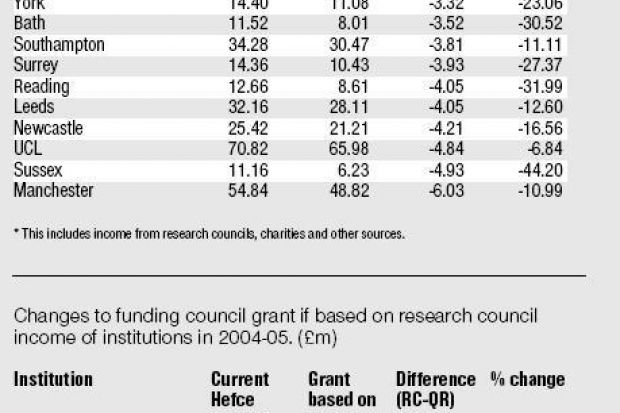Cranfield University would stand to earn millions of pounds more a year if block research grants were to be distributed on the basis of external research grants won by institutions. But Manchester University would see its funding coun cil grant cut by millions of pounds under such a system.
These are some of the findings of the first detailed study of how English universities would fare under a system of allocating block grants using different metrics, including total external research income or research council income, rather than research assessment exercise ratings.
The potential impact of Treasury proposals made last month - to use metrics as an alternative to RAE results - has been analysed by the Higher Education Policy Institute. The report reveals dramatic variations between institutions, depending on which metrics are used to determine grants.
The report concludes, for example, that if block grants to universities were based on external research income - from research councils, charities, industry, the European Union and government departments - Cranfield's funding would rise by more than £10.5 million a year or 210 per cent in science, technology, engineering and medicine subjects. The study focuses on this group because this is where metrics are most reliable.
Manchester, on the other hand, would lose £6 million or just under 11 per cent in funding.
But if block grants were based on research council funding alone the picture would be markedly different. Cambridge University would benefit most, seeing a £24 million increase in its block grant in science, technology, engineering and medicine subjects. Imperial College London would see the greatest loss in absolute terms: more than £19 million.
Bahram Bekhradnia, director of Hepi and report co-author, said the results showed the alternatives to the RAE looked "very shaky".
"We've done an objective analysis and, having looked at the evidence and certainly what's on the table at the moment, it doesn't look very appealing," he said. "The Government's proposal is completely unthought-through."
Clifford Friend, deputy vice-chancellor of Cranfield, said: "The academic, peer-review approach to the RAE has failed to recognise the high-quality strategic research so crucial to the UK's economic competitiveness. A metrics-based system, focusing on income from research councils and industry, must clearly be the most effective method for Hefce to allocate future quality-related funding."
But Dame Nancy Rothwell, Manchester University's pro-vice-chancellor for research, said: "The concern is: what metrics would you use. Research income creates a self-perpetuating system and doesn't work for the humanities. But I don't like different systems for different subjects - it's a killer for interdisciplinary research."
Ian Leslie, pro vice-chancellor for research at Cambridge, said: "One cannot just add up all funding - there are various degrees of emphasis on research quality."
anthea.lipsett@thes.co.uk </a>
Register to continue
Why register?
- Registration is free and only takes a moment
- Once registered, you can read 3 articles a month
- Sign up for our newsletter
Subscribe
Or subscribe for unlimited access to:
- Unlimited access to news, views, insights & reviews
- Digital editions
- Digital access to THE’s university and college rankings analysis
Already registered or a current subscriber? Login
